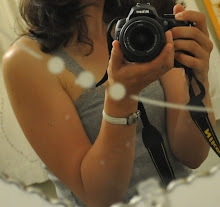What Does a Goodbye Feel Like?
I am not one of those who "hate goodbyes." I thrive on them. The shortest way to explain this (though possibly not the clearest) is to say that the awareness of an end is what fills me up instantenously and unfailingly with the unfiltered sensation of life. A commodity hard to come by (without resorting to chemicals, meditation classes, or extreme sports), so I cultivate the art of saying goodbye whenever there is a chance to draw a line and wave one last time at the other side.
The question, however, is not so much whether we like or hate goodbyes, but whether we can say goodbye. It's one thing to seek the aesthetically packaged little gems of moments like the ones mentioned in the paragraph above, but it is completely different to try to comprehend the vacuum spreading like a contagion after a goodbye that hits you right in the soft underbelly.
I tried, and didn't even know how to begin to say goodbye to the place where I grew up. It was the end of summer, and it felt like the end of the world. How can I say goodbye -- and really mean it -- to my windows on the third floor where in Grade 5 Ana (from the sixth floor) and I established a manual messaging system consisting of two yogurt containers on a piece of string? the elaborate comic strips my brother and I drew on the wooden frameworks of our beds? the confident rectangles of sunshine on the kitchen floor announcing another safe and cosy day reflected on my parents' faces? that priceless excitement of a positively charged hot summer day promising such sweet things? the sensation of life unfolding effortlessly, naturally? the bell of my elementary school sending rivers and rivulets of pupils in all directions? the streets and street corners where every time I went out, I could easily be walking in my mother's footsteps? the shop windows where I probably checked many a morning how cool I looked on the way to my high school across town? the main pedestrian street where on warm summer evenings we paraded our teenage fashions, dreams, longings and desires? the green river where we went to catch tadpoles for a biology class and along which I later jogged? the rounded hills gently leaning from all sides (the one visible from my window still showing a barely noticeable trace of the letters T I T O)? our sad-looking apartment buildings, erected with soc-realist vigor in the 70s but worn out, stained, and yellowed by the war in the 90s and keeping the secrets of many souls who came and went? the neighbours, friends, acquaintances and their stories? an uforgettable era in a forgotten and non-existing country? the dawn of my memory? the playground that heard my first words? the place whose name resounds with our laughter at dinner table? where I learned everything I know about the guts of life?
If we could say goodbye to such things and really mean it, we would die the very next minute.
If I believed -- and I don't -- that we could survive this goodbye, it would perhaps feel a little like this.
The question, however, is not so much whether we like or hate goodbyes, but whether we can say goodbye. It's one thing to seek the aesthetically packaged little gems of moments like the ones mentioned in the paragraph above, but it is completely different to try to comprehend the vacuum spreading like a contagion after a goodbye that hits you right in the soft underbelly.
I tried, and didn't even know how to begin to say goodbye to the place where I grew up. It was the end of summer, and it felt like the end of the world. How can I say goodbye -- and really mean it -- to my windows on the third floor where in Grade 5 Ana (from the sixth floor) and I established a manual messaging system consisting of two yogurt containers on a piece of string? the elaborate comic strips my brother and I drew on the wooden frameworks of our beds? the confident rectangles of sunshine on the kitchen floor announcing another safe and cosy day reflected on my parents' faces? that priceless excitement of a positively charged hot summer day promising such sweet things? the sensation of life unfolding effortlessly, naturally? the bell of my elementary school sending rivers and rivulets of pupils in all directions? the streets and street corners where every time I went out, I could easily be walking in my mother's footsteps? the shop windows where I probably checked many a morning how cool I looked on the way to my high school across town? the main pedestrian street where on warm summer evenings we paraded our teenage fashions, dreams, longings and desires? the green river where we went to catch tadpoles for a biology class and along which I later jogged? the rounded hills gently leaning from all sides (the one visible from my window still showing a barely noticeable trace of the letters T I T O)? our sad-looking apartment buildings, erected with soc-realist vigor in the 70s but worn out, stained, and yellowed by the war in the 90s and keeping the secrets of many souls who came and went? the neighbours, friends, acquaintances and their stories? an uforgettable era in a forgotten and non-existing country? the dawn of my memory? the playground that heard my first words? the place whose name resounds with our laughter at dinner table? where I learned everything I know about the guts of life?
If we could say goodbye to such things and really mean it, we would die the very next minute.
If I believed -- and I don't -- that we could survive this goodbye, it would perhaps feel a little like this.


